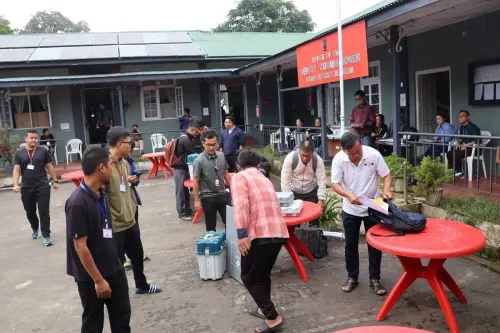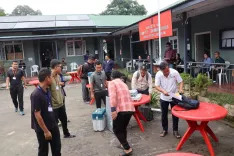Fishermen Rally Against Chennai Marina Loop Road Initiative

Synopsis
Key Takeaways
- Protest by fishermen from 10 coastal villages.
- Demand for a protected traditional fishing zone.
- Opposition to development plans threatening livelihoods.
- Concerns over land acquisition for housing projects.
- GCC's redevelopment plan for eco-friendly public space.
Chennai, April 3 (NationPress) Fishermen from 10 coastal villages, stretching from Nochikuppam to Srinivasa Puram (Mullikuppam) in Chennai, organized a significant protest on the Marina Loop Road on Thursday, advocating for the creation of a designated traditional fishing zone in the region.
The demonstrators, representing traditional artisanal fishing communities, insisted on their rights over the sands, sea, and seafront. “This coastline has been the home of our people for generations,” stated one of the protest leaders. “We are not deep-sea trawler operators. We are artisanal fishermen who depend on these shores for our livelihood,” they added.
The fishermen voiced strong opposition to several development proposals, including the envisaged sea bridge and blue flag beach certification project, arguing that these plans jeopardize their way of life and restrict their access to traditional fishing grounds.
“Marina Loop Road is not merely a stretch of asphalt for us,” remarked a local fisherman, further explaining, “It is where we bring in our catch, clean our nets, and sell the day’s fish. The road has been integral to our working life for generations.”
According to the protestors, the Chennai Corporation constructed the Loop Road solely because it was unable to widen the Santhome High Road. They suggested that the Corporation should prioritize widening Santhome High Road to a two-way thoroughfare to manage traffic rather than rerouting it through the Loop Road.
Sekar, a fisherman from Mullikuppam, expressed, “The decision to designate Marina Loop Road as a public road must be reversed. Redirecting traffic through this road endangers our livelihoods and safety.”
Another significant concern raised during the protest was land acquisition. Fishermen claimed that land appropriated by the government for developing housing projects for fisherfolk remains unreturned or misallocated. They stressed the generational importance of their occupation.
“Fishing is not just a job for us -- it’s our heritage,” one fisherman remarked, adding, “Our children grow up learning this trade, and they require access to the seafront to sustain our way of life.”
The protest caused traffic disruption along the Marina Loop Road until Thursday afternoon.
Meanwhile, the Greater Chennai Corporation (GCC) is contemplating a redevelopment strategy for the Loop Road. The proposed vision aims to transform it into an eco-friendly public space that focuses on non-motorized traffic, including pedestrians and cyclists.
A tender has already been issued by the GCC’s Special Projects Department, requesting consultancy services to prepare a Detailed Project Report (DPR) at an estimated cost of Rs 17.7 lakh.
The consultant will carry out a topographic survey, land use and activity studies, traffic and transportation surveys, assessments for pedestrians and cyclists, a parking study, a street vending analysis, and a landscape study to evaluate tree cover and shading potential.
Based on these insights, the DPR will encompass concept designs, detailed engineering drawings, bills of quantities, and construction-ready plans.
The proposed design envisions dedicated pedestrian pathways, green areas, and recreational spaces in line with Coastal Regulation Zone (CRZ) and National Green Tribunal (NGT) guidelines.
An official from GCC stated, “Our goal is to transform Loop Road into a vibrant, inclusive, and accessible area for everyone while also tackling the existing challenges.”
Spanning over 2.55 km, Loop Road links Lighthouse Junction to Greenways Road Junction and caters to a diverse community of fishermen, vendors, and beachgoers. However, it currently encounters issues like traffic congestion, inconsistent parking, and unregulated vending, which the redevelopment aims to address.









